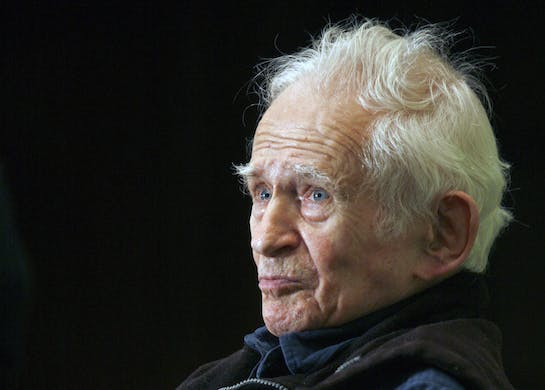Reckoning With Mailer
A senior scholar whose work on Mailer began in graduate school, Robert Begiebing does not take his subject for granted, instead making ‘Norman Mailer at 100’ a bid to reconsider the legacy of a protean author.

‘Norman Mailer at 100: Conversations / Correlations / Confrontations’
By Robert J. Begiebing
Louisiana State University Press, 226 pages
That Robert J. Begiebing feels compelled in this collection of essays and an interview to write a preface defending Norman Mailer’s importance and relevance not only to contemporary literature but to American history and, indeed, to the fate of the planet, reflects how much this controversial and award-winning writer has been downgraded.
The charge sheet against Mailer is a long one, including politically incorrect views about feminism, the near-fatal stabbing of his wife, his machismo, and, in general, making an ass of himself in public in clashes with fellow writers, one of them occurring on television when he accosted Gore Vidal.
Mr. Begiebing does not excuse Mailer the man or the writer, treating him, as Mailer treated himself, as a work in progress, with grievous faults but the courage to confront and, in many cases, overcome his shortcomings — as he shows in his brilliant and groundbreaking book, “Advertisements for Myself.”
What writer, Mr. Begiebing argues, did as much to critique mass media, politics, the nature of war, the space program, and the role of technology (damn those plastics) as any public intellectual could in a culture that — compared to earlier generations — did not put writers at the center of societal development.
Mr. Begiebing, a senior scholar whose work on Mailer began in graduate school, does not take his subject for granted, instead making “Norman Mailer at 100” a bid to reconsider the legacy of a protean author.
Another scholar, one intent on celebrating Mailer, might well argue that he, in fact, is doing well, thank you very much — with several media projects about his life and work coming to fruition, abetted by the Norman Mailer Society and the Mailer Review, and by his inclusion in the Library of America.
Mr. Begiebing’s outreach to the unconverted is reflected in his table of contents. His first chapter, “Mailer and Hemingway,” is no well-worn academic comparison but rather an astute consideration of their lives and works through a focus on their correspondence, so that the language of love, for example, which seemed overdone in “A Farewell to Arms” is, in fact, borne out in letters from the nurse Hemingway fell in love with during World War I, and those from his first wife.
What Hemingway went through in writing and publishing “A Farewell to Arms” parallels Mailer’s experience, though the younger writer did not know it: “had a cache of Hemingway’s letters been available to the young Mailer … he would have recognized the parallels between his own struggles to write his big war novel and Hemingway’s, and he would have recognized Hemingway’s experience as a young man publishing his first best-seller and the difficulties that flow from such success, not least postcelebrity writers’ block and familial complications.”
Biography is never far from Mr. Begiebing’s concerns even though he is not writing a biography. So the second chapter about Mailer’s journal keeping is illuminated by the startling resemblance with Jung’s analysis of himself. Both men rigorously investigated their motivations and came out of the process renewed.
Mr. Begiebing does not shy away from Kate Millett’s attack on Mailer in “Sexual Politics” and his rejoinder in “The Prisoner of Sex.” Mailer’s weaknesses and strengths are amply analyzed. Yet Mr. Begiebing follows up with Joan Didion’s uncompromising faith in Mailer’s significance, and quotes her: “he is one of the few people who can write about sex without embarrassing me. I think sex is a lot darker than Kate Millett does. I think there is a lot more going on than meets her eye.”
Mr. Begiebing has chapters on Mailer and Emerson; Mailer and Whitman; an interview he did with Mailer that covers a lot of ground up to the publication of “Ancient Evenings.” Transcending biography, Mr. Begiebing provides a provocative fictional dialogue between Hemingway and Mailer, and finishes up with Mailer and historian Joseph Ellis’s “unsettling dialogues on democracy.”
This book is a workout of the best kind, quite a refreshing account of an enduring engagement with a writer’s life and writing. Which is why Joan Didion’s comment on responses to Mailer is so apposite: “It is one of those testimonies to self-regard in the literary life that large numbers of people remain persuaded that Norman Mailer is no better than their reading of him.”
Mr. Rollyson is the author of “Norman Mailer: The Last Romantic.”

